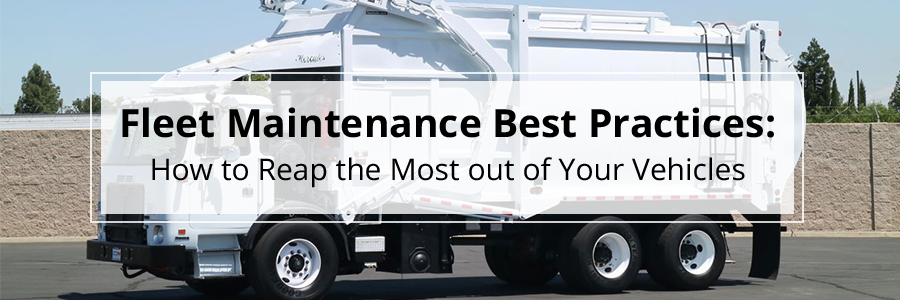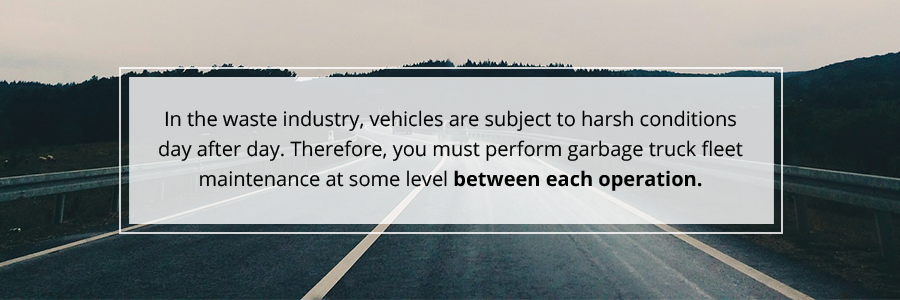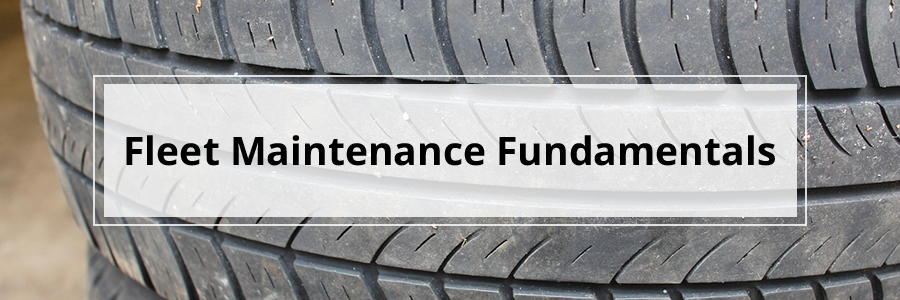Fleet Maintenance Best Practices: How to Reap the Most out of Your Vehicles

Preventative fleet maintenance is the bedrock of waste fleet management. In many ways, fleet maintenance is at the root of profitability for a fleet company. It allows for more consistent and reliable across-the-fleet performance from trucks that operate in a commercial capacity.
When companies take fleet maintenance steps on a monthly, weekly and even daily basis, they stop minor problems from becoming major, costly repairs. Learn more about how you can get the most from your equipment with proper fleet management.
Fleet Maintenance For Refuse Trucks
While all trucks have their expenses, any commercial trucking operation can save untold sums of money by employing some basic fleet maintenance procedures. When you take little steps to ensure smooth running, problems with trucks are less frequent, and those that do occur are generally remedied with only minor work. With basic, common-sense fleet maintenance, performance is optimal and breakdowns are rare — all of which makes it possible for trucks to achieve their utmost in productivity and efficiency.

One of the most demanding segments of the trucking sector is the waste industry, in which vehicles are subject to harsh conditions day after day. Therefore, you must perform garbage truck fleet maintenance at some level between each operation.
While this might seem like a lot of extra work, the efforts that go into refuse fleet maintenance are a minor burden that always pays off when you consider the high-cost consequences of neglect. Neglect inevitably results in vehicle failure and downtime.
The Value of Garbage Truck Fleet Maintenance
When it comes to refuse fleet maintenance, the preventative approach is a safer and more economically viable mode than the reactive approach. With the latter, fleets operate without regular maintenance, and they handle problems when they occur on a truck-by-truck basis.
In more ways than one, reactive maintenance is a risky method for handling problems. For starters, a truck could be sidelined at any time or place, which can set back a fleet's service schedule and lead to unforeseen repair costs. Secondly, the servicing of trucks at random, roadside locations during odd hours can be far more dangerous than simply servicing them in a garage between regular shifts.
There's also the savings: With a good refuse fleet maintenance plan, the economic advantages are immeasurable for garbage truck companies of any size. On one hand, it is relatively inexpensive to thwart a problem before it begins or remedy an issue just developing. The key is catching the problem in the safety of a garage before embarking on a daily shift. However, when you discover a problem the hard way in the middle of a wide, open freeway, the repair costs could multiply threefold.
Fleet Maintenance Fundamentals

For garbage truck fleets that serve large urban areas, breakdowns and inefficiency can lead to thousands of unhappy residents. Simply put: Refuse fleet maintenance translates to productivity on the trash-collecting cycle, which is vital in neighborhoods where everyone expects to have their garbage collected on time, according to schedule. By reducing the likelihood of downtime, refuse fleet maintenance allows waste-collection companies to cut back on spare vehicles. The result is saving money on garbage truck maintenance costs and freeing up truck-lot space.
Of course, preventative maintenance does come with its own minor expenses. The whole point is to determine where to spend money and how to turn that into bigger savings in the long run. Too much focus on areas that need little maintenance could be a waste of money, whereas daily or weekly inspections of areas that are expensive to repair can ultimately save money two ways: by thwarting the need for costly repairs and extending the life of a truck for two years or more.
The best practices in garbage truck fleet maintenance include regular care for the:
- Axle
- Battery
- Brakes
- Chassis
- Coolant
- Engine
- Filtration
- Hydraulics
- Tires
- Transmission
In particular, brakes and tires endure a lot of stress on trash-collection routes due to the constant stop-go-stop motions of a garbage truck. The stopping and going can cause heat and friction against the brake pads, which can ultimately cause them to fail. There really is no leeway on preventative maintenance — either you perform it in a timely manner, or you face costly repairs and a shortened vehicle lifespan.
Fleet Maintenance Best Practices
The frequency at which you perform maintenance on trucks depends on the policies of the fleet's management and the conditions under which operators run the trucks. With most fleets, however, companies schedule truck maintenance to occur after a certain number of miles on the road — or hours of operation — for a given vehicle.
The philosophy behind maintenance is similar for all trucks across the commercial vehicle sector. After all, every truck consists of the same basic parts: battery, engine, tires, etc. Nonetheless, treatments vary slightly according to the functions and unique components of a given truck type.
For the majority of truck fleets, following these tips will help ensure long life and hassle-free performance from each vehicle:
Engine
The engine is the heart of each and every truck in the fleet. Without a well–maintained and properly functioning engine, a truck could fail while en route to its next destination. Common causes of engine failure include infrequent oil changes, insufficient or low–quality oil, overheating, wasteful idling, as well as flaws in the engine parts.
Oil makes it possible for engine parts to move, but the oil itself gradually degrades as a truck is driven around from one loading/unloading zone to another. Under high pressures, properties within the oil begin to carbonize, which renders the oil ineffective. If driving continues beyond an oil change–out interval, parts within the engine will eventually start to grind, which inevitably leads to parts–wear and overheating. For all these reasons and more, timely oil changes are an essential protocol of refuse fleet maintenance.
Other engine parts in need of regular inspection include the air filter, timing belt/chain, and drive belt. The purpose of an air filter is to strain incoming air of dust and dirt, yet filters eventually become clogged and need to be replaced. The timing and drive belts respectively synchronize the crankshaft and run the engine accessories, but both can become worn and cracked over time, and should, therefore, be inspected during each oil change. Furthermore, if leaking occurs under a truck, inspect the engine immediately. Any leak is likely due to a crack in the oil or coolant gasket.
Batteries
When a battery runs low on juice, a truck could wind up stranded at its next stopover. Waiting out the life expectancy of a battery is dangerous when you're constantly on the move between one point of shipment and another.

You should inspect the battery during each maintenance juncture. The inspection should entail a cleanout and load-testing of the battery cables to ensure the battery charge is sufficient. One battery type to beware of is the low-voltage kind, which tends to expire sooner due to the stress they put on the alternator and ignition of a truck.
Cooling Systems
It's no secret that truck engines produce tons of heat. With refuse trucks, there's twice as much pressure on the engine thanks to the trash compactor and hydraulic lift, resulting in double the heat. Considering all the functions at stake, you should keep the truck's cooling system in peak condition.
Over the course of many long routes, internal parts are liable to endure wear and tear. Cooling-hose leaks are a common sign of such corrosion. Unfortunately, these problems can be difficult to spot due to the heat of the engine itself, which tends to evaporate leaked coolant residues. That’s why you should pressure-test the cooling system of each and every truck in your commercial fleet on a regular basis.
Tires
Out of all the different parts on a refuse truck, the tires are among the costliest when it comes to maintenance issues. The wallet damage can be minimized, however, if you regularly check tire air to ensure proper alignment of the front axle, which is key to warding off tire wear.
During each routine maintenance, you should spend a few minutes inspecting the front axle toe to see whether or not it's in alignment. If the axle is not in alignment, an adjustment is in order.
U-Bolts and Fasteners
You should re-tighten other truck parts at every opportunity, including the u-bolts of the chassis and axle, as well as the fasteners of the wheel rims. Those fasteners are the glue that keep each truck intact. Loosening of fasteners occurs daily as trucks endure the vibrating impacts of turns, maneuvers, and load and unload functions. You need to tighten them on a regular basis to prevent costlier damage down the road.
Oil and Grease
Oil is the lifeblood of any truck, but grease helps the joints from getting dry and calloused. Trucks deserve the best oil and grease products on the market — the kind that boost the performance and extend the life of truck engines and components.
The u-joints are among the most important parts of the truck. You need to grease them regularly. Without that lubrication, the u-joints give out entirely, which could only leave the truck as a stranded, sitting duck for a costly towing service.
Other parts of the vehicle that regularly need re-greasing include the front ends and clutch linkages. It's important, however, that the grease is a quality brand and not just any old product, because cheap lubricants tend to be ineffective and even corrosive.
Daily Fleet Maintenance Inspections
As part of the morning round of inspections, each fleet driver should do a slow walk around the truck to ensure the lights work, the tires are pumped, the fluid levels are full, and the fuel is optimal.
Aside from the basic daily once-over, the most effective waste management fleet maintenance dictates that each driver cleans the packer blade in their designated garbage truck. Doing so will extend the vehicle's performance life. Better yet, fleet companies should enact incentive programs that encourage drivers to maintain the cleanliness and operability of their assigned trucks on a daily basis.
In addition to the daily quick inspection and keeping the vehicle clean, your fleet maintenance plan should cover:
Tires
Each morning, before you rev up a truck and take it out for its daily service routes, you should inspect every tire to ensure proper air pressure. With all the heavy loads that a garbage truck carries over the course of a daily cycle, it's crucial you maintain tires within the needed parameters.
Fluids
As with all commercial vehicles, the drive train under a garbage truck consists of all the usual components: engine, suspension and transmission — all of which need fluids to function properly. Waste trucks regularly need basic vehicle maintenance, including oil changes, antifreeze replacement and routine fluid checks.
For each truck, whichever driver is on shift should perform basic fluid-changing tasks. Often times, a fleet driver will assume that the oil has been checked by one of his colleagues. When all of the other drivers are thinking the same thing, the inevitable consequence is costly maintenance neglect. It’s essential you train all in the basics of fluid changing on fleet trucks.
Hydraulic System
On garbage trucks, the hydraulic system generally consists of cylinders, hoses, the fluid filter and the pump. The removable hydraulic fluid filter is the part that keeps the fluid free of impurities that would otherwise drag down the performance of a truck.
To ensure maximum operability, you should replace the filter with a new one every time you change the fluid. Now and then, you should inspect the fittings that link the hydraulic hoses and tubing for signs of wear and tear. When leaks occur along these parts, the hydraulic pressure drops. This robs the truck of its ability to use its hydraulic functions.
At the core of this system sits the engine-powered hydraulic pump, which can be pressure-checked for reliability with an external testing meter. You should also check the fluid reservoir in the hydraulic system on a regular basis for signs of discoloration, which would be an indicator of contamination. Ideally, you should check this fluid as often as the engine oil to ensure the hydraulic system has enough fluid to operate.
Compactor Body
If there's one feature that makes a garbage truck instantly recognizable to the passerby, it's the compactor body, the section in the back of the truck that empties out dumpsters and scoops garbage inwards. The movements the compactor body performs are reliant on sufficient lubrication of numerous joints.
When squeaking noises occur, chances are the metals are rubbing against each other due to poor lubrication. If left unremedied, the friction could cause the metal to crack in certain spots, which would hinder the compactor body's functionality. You should regularly inspect the moving metal parts to ensure the ongoing operability of each garbage truck within a fleet.

Refuse Fleet Maintenance Saves Money
Fleets that serve the vital needs of the public must be fully operable at all times. When just one truck stalls or gets sidelined, a fleet could be faced with countless complaints and backed-up service commitments. In an industry where time is money, there's no time for downtime. That is why garbage truck fleet maintenance is vital, because a little time spent on regular checkups and tune-ups is far more economical than the mass amounts of money that unchecked truck repairs can swallow up.
At Truck Site, we specialize in a wide inventory of CaliforniaClean® trucks for a broad range of industrial and commercial uses. With our high-quality garbage trucks and street sweepers, productivity and efficiency are ensured with practical applications and timely, preventative maintenance. Most of the vehicles in our inventory are from municipals and government agencies and have not been privately owned.
The majority of our trucks are assembled in sunny California, an environment known for its dry, clean, vehicle-friendly roads. When you buy one of our optimal used trucks, you can drive it off our lot the same day — there's no delay at the manufacturing end.
We also ship our trucks to any location throughout the world. We even honor custom-paint requests. Across the United States, Canada and even as far away as Russia, customers have attested to the quality of our vehicles.
To learn more about our trucks and sweepers or to read more tips on maintenance and other vehicle concerns, visit Truck Site today.
Back To List